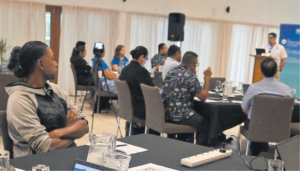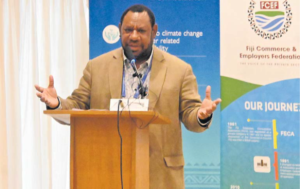Labour migrants are not just foreign workers.
This was highlighted by International Organisation of Migration (IOM) Fiji chief of mission and sub-regional coordinator Solomon Kantha in an interview with The Fiji Times following a workshop conducted last week at the Novotel in Lami focused on fair management, ethical recruitment and the employment of migrant workers in Fiji.
He noted the workshop was a collaboration between the Fiji Commerce and Employers Federation (FCEF) and the IOM, and it was also the first of its kind to be scoped specifically around migrant workers.
“I think it covers everyone, including domestic workers, and they play a very important role especially when it comes to the whole process of migrant employment journey from recruitment to their stay, when they’re working and also when they return home,” Mr Kantha said.
“It’s really important that they (employers) understand some of the important issues around workers’ rights, how they should be treated, their benefits, their welfare, because so often employers and businesses are not aware of some of the rights that workers have.”
He said that led to exploitation and trafficking of workers.
“We find exploitation of migrant workers is a big issue, and it’s important that not only the government but civil society and other partners in the community are aware of the issues facing migrant workers, but more importantly the businesses who are recruiting, they’re the main ones in the picture.”
The chief of mission stressed that the IOMs’ role was to support the Government and its stakeholders who are involved in dealing with migrant workers to build their capacity and understand what the issues are when it comes to the exploitation and trafficking of migrant workers.
“It falls within the jurisdiction of the Government to identify and also assist those who are exploited, but more importantly is dealing with perpetrators who are involved.
“We are here to support governments to come up with relevant policies, for instance, a national action plan to counter trafficking of human beings and national strategies so that they are aware of what the referral processes are and how they can deal with cases more effectively.”
The sub-regional coordinator was also asked if they had suggestions on certain laws that would help the Government in dealing with perpetrators ill-treating their migrant employees.
Mr Kantha said different countries required different approaches to the creation of certain policies and laws.
“I think there are various laws for different countries, there are labour laws and there are also immigration laws but there are also crimes Act, penal codes in some jurisdictions here.
“And this is where, depending on the nature of the crime of the offence, this can be prosecuted under those different laws.
“So for instance, when it comes to trafficking in persons, Fiji has a Crimes Act that specifies the type of exploitation and the penalty for those exploitation.
“This is really good but what we are working on now is that it has to cover all aspects of exploitation, right? Not just the sexual exploitation or child exploitation, but also labour exploitation, so that we can be able to effectively deal with the perpetrators.”
As the funding partner for the workshop, Mr Kantha said their objective during the program was to ensure that employees and businesses were aware of issues and were able to take action to deal with when they came across issues of abuse or exploitation of workers or refer it to the appropriate authorities.
“We hope that they will be able to share their experiences, what they’re doing and how they can influence others who are not members of FCEF as well and maybe bring them in to have a dialogue.”
The Management of Fair & Ethical Recruitment & Employment of Migrant Workers workshop ended last Friday with representatives across 25 FCEF member organisations directly benefiting from the program.



![[L-R] FCEF vice president Eldon Eastgate, Employment Minister Agni Deo Singh and IOM Fiji Chief of Mission and Sub-Regional Coordinator Solomon Kantha pictured at the migration training facilitated by FCEF. Picture: JOSEFA SIGAVOLAVOLA](https://www.fijitimes.com.fj/wp-content/uploads/2025/05/Picture1-9.png)

